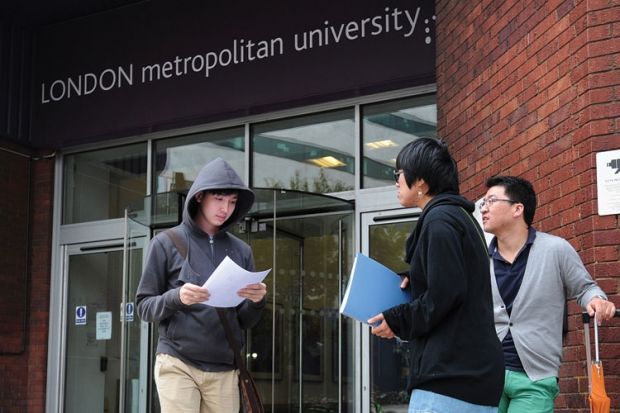Source: Getty
Do come back: international student intake won’t rebound until 2018
London Metropolitan University recorded a financial surplus in the year it was stripped of its powers to recruit overseas students thanks to savings from redundancies, property sales and a state bailout.
But more savings, including £9.3 million this year, will be needed to help it break even again as international recruitment will not recover for several years, its annual accounts state.
However, the newly published statements show that the financial situation is not as bad as was feared when the Home Office revoked London Met’s visa licence just before the start of the 2012-13 academic year.
In November 2012, after the revocation, London Met agreed a revised budget in which it forecast that its income would fall by £37 million compared with its original outlook, thanks also to a fall in domestic enrolments.
Such a drop would have accounted for 25 per cent of London Met’s 2011-12 income and resulted in an operating deficit of £5.5 million.
But while the university’s overall income fell by £28.3 million in 2012-13 as fees from overseas students decreased by £17.1 million, it managed to record a £2.6 million operating surplus in 2012-13.
That result was driven by “cost-saving measures including deletion of vacant posts, a voluntary severance scheme, targeted restructuring and savings in non-pay costs”, the university’s accounts state.
About £10 million of savings came from reducing staff costs to about £76 million following the closure of courses.
Malcolm Gillies, London Met’s vice-chancellor, who is retiring at the end of the academic year, said the university had “acted quickly and responsibly” to overcome some “tough challenges” in 2012-13.
Warning that more savings would need to be made in “areas of low demand”, Professor Gillies said that the university was “finalising a blueprint for the future development of our portfolio of courses”.
London Met received help from the Higher Education Funding Council for England, which agreed to convert a “strategic development loan” into a non-repayable grant worth £3.4 million, the accounts show.
It also agreed to give the university five more years to pay £17.5 million of outstanding fines – levied in 2009 after major inaccuracies emerged in the institution’s student completion figures – rather than demand payment by the end of 2013‑14.
However, the legacy of the visa revocation is likely to continue for several years, the accounts state.
While London Met hopes to regain its full licence by 2014-15 – it currently can recruit only limited numbers of overseas students – it forecasts that its international intake will not return to pre-revocation levels until 2018-19.
Home and European numbers are also due to decline owing to changes in student number controls and increased competition in London, the accounts add. That will require London Met to “reduce support costs and improve service efficiency”, as well as “resizing the university’s estates and services”.
Cliff Snaith, secretary of London Met’s University and College Union branch, said he believed the university was “over the worst”.
He added: “There is also some hope because there might be a change in policy when the new vice-chancellor arrives.”
Register to continue
Why register?
- Registration is free and only takes a moment
- Once registered, you can read 3 articles a month
- Sign up for our newsletter
Subscribe
Or subscribe for unlimited access to:
- Unlimited access to news, views, insights & reviews
- Digital editions
- Digital access to THE’s university and college rankings analysis
Already registered or a current subscriber? Login





